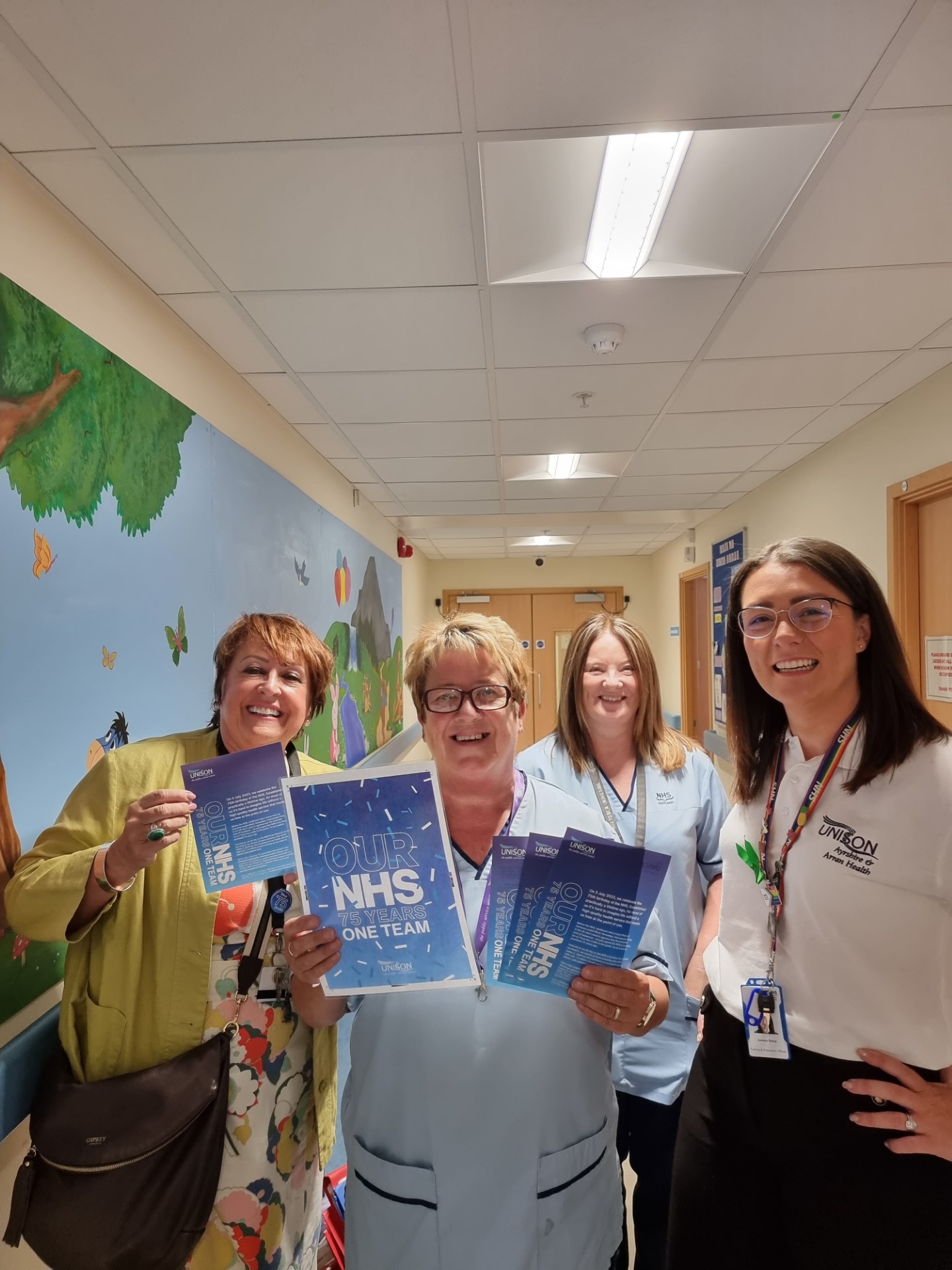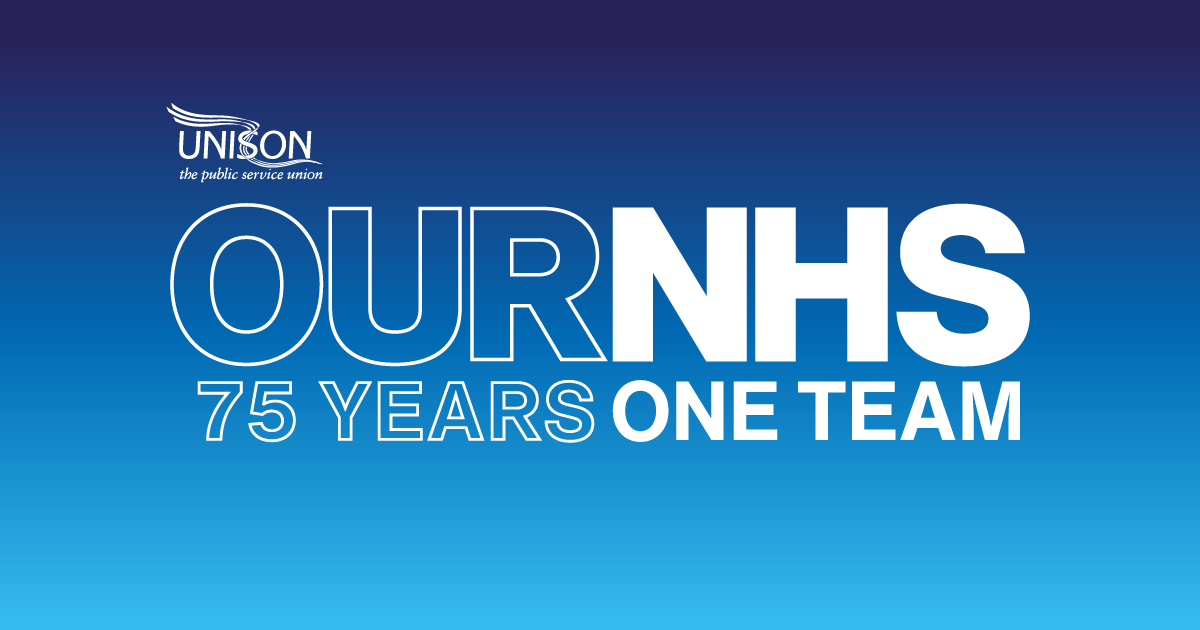Matt McLaughlin, head of health, at UNISON Scotland, explores five of the main issues in the NHS at 75 years old. This article was in The Herald
“As our NHS turns 75 the new First Minister wants a ‘national conversation,’ about its future. I’m sure he’ll forgive those of us working in the NHS when we respond with a quote from that well known philosopher Elvis Presley. What we need is “a little less conversation – a little more action”.
You won’t find many folk inside the NHS that will say we aren’t facing a crisis and in need of reforms. Plenty people outside agree too. The Scottish Governments own ‘household survey’ recently recorded that satisfaction amongst adults in our NHS was at 78%. Not bad, but the same survey in 2011 recorded a satisfaction level of 88%.
Stop banking on it
 At present around 14.5% of Scotland’s working population, work in health or social care. Our politicians tell us that there are more folk working in the NHS than ever before. Yet we have significant challenges in recruiting and training enough health and social care professionals to meet our health care expectations.
At present around 14.5% of Scotland’s working population, work in health or social care. Our politicians tell us that there are more folk working in the NHS than ever before. Yet we have significant challenges in recruiting and training enough health and social care professionals to meet our health care expectations.
The NHS spent more than £500m on bank and agency clinical staff last year and the official. That’s very far from being whole story. The Scottish Government’s Workforce Report doesn’t record bank, agency and additional work hours spend for other jobs, like Portering, Catering and Diagnostic services. Survey after survey identifies short staffing as a major pressure on service delivery and staff wellbeing. At the same time as the Governments own workforce statistics are showing unfilled vacancies are on the rise.
This needs both immediate and then sustained action. In the short term more needs to be done to reduce agency spend and make more effective use of the existing cohort of staff. Longer term the NHS needs effective workforce planning, not just more doctors and nurses. We need resource investment in training and retention of staff in workplaces that are safe and facilitate working into later life. A big change from chewing workers up and then spitting them out which is what too many NHS staff think is happening now.
Not so much a National Care Service as a Trojan Horse
Despite what the Scottish Government seem to think, health care and Social care are not the same thing. They don’t though exist in entirely different worlds as anyone who looks at the interaction between hospital discharge and care plans is aware. Social care has massive problems in recruiting and retaining staff. This should surprise no one. How can it be right that the most vulnerable in our society are cared for by the worst paid and most precariously employed?
 Unfortunately, the Scottish Government’s National Care Service (Scotland) Bill won’t address any of the real issues. Going well beyond residential or even care at home – ministers want a system responsible for “social care, social work and community health”. This will involve taking responsibility for a raft of services out of the NHS to be administered by new care boards in a “vibrant and stable” market. It has been roundly condemned by just about everyone who has been asked an opinion. This is Trojan Horse legislation that will see outsourcing of services and workers in key areas such as District Nursing, Mental Health, Addictions and Public Health outsourced if their health Board fails to win contracts – and there is a section of the bill that allows excluding them from even bidding!. None of this is acceptable
Unfortunately, the Scottish Government’s National Care Service (Scotland) Bill won’t address any of the real issues. Going well beyond residential or even care at home – ministers want a system responsible for “social care, social work and community health”. This will involve taking responsibility for a raft of services out of the NHS to be administered by new care boards in a “vibrant and stable” market. It has been roundly condemned by just about everyone who has been asked an opinion. This is Trojan Horse legislation that will see outsourcing of services and workers in key areas such as District Nursing, Mental Health, Addictions and Public Health outsourced if their health Board fails to win contracts – and there is a section of the bill that allows excluding them from even bidding!. None of this is acceptable
Thoroughly Modern Medicine
We have heard a lot about ‘innovation’ in recent years. In truth the NHS and our politicians have been dancing around the edges of ‘modern medicine’ for decades. There has been some progress, but some initiatives come at eye watering cost. The ‘Da Vinci’, a robot system which can perform a range of complex surgeries, comes in at £1.5m. There is also room for more mundane robotics such as robotic pharmacy dispensers or automated portering systems which can be used to move heavy loads which can free up valuable people power to interact and provide direct patient care.
Someone other than a Doctor will see you now …

We obviously need doctors in our hospitals and GP’s in our communities but we need to explore the most effective ways of delivering services. The pandemic has taught us that for some conditions a video or phone call consultation works just as efficiently as a trip to the surgery. Why does on need to be the Doc that we speak to? Many of our health needs could be resolved by the Nurse Practitioner, Physio, Dietician or even the local chemist. If medics are already using AI to assist with more accurate diagnosis, why can’t other health care professionals?
There’s more to health than the NHS
It isn’t just about dealing with the chronic staff shortages and better wages, although we need both of these things. Even with more people working smarter, the NHS is at risk. Scots are still struggling to shake off our label as the sick man (and woman), of Europe. More Scots are living longer, but generally we are doing so in poor health, which itself puts demands on the NHS. Poverty is on the increase in Scotland. As sure as the sun rises in the East with poverty comes health inequality and with health inequality comes poor health outcomes.
Scotland’s government – and Parliament – need to get serious about Public Health. They need to play their part in keeping people healthy. So that the NHS can play its part when they’re not.”


